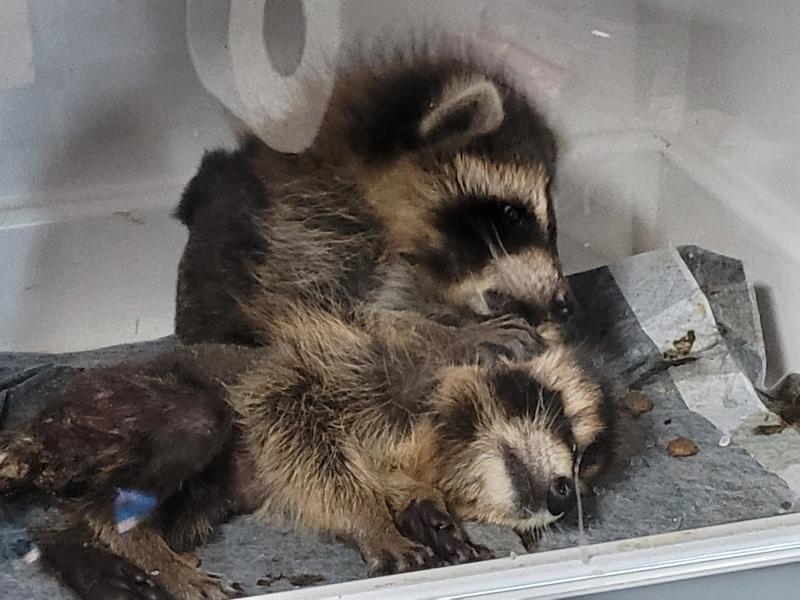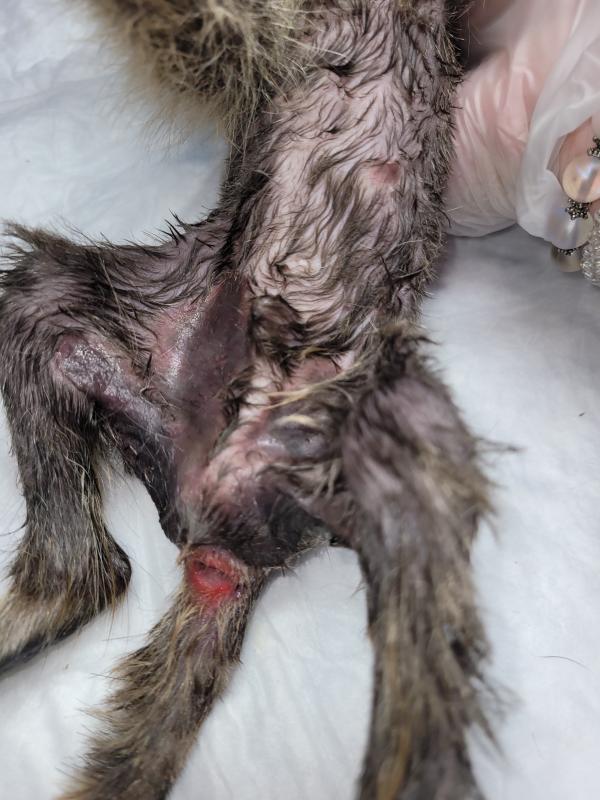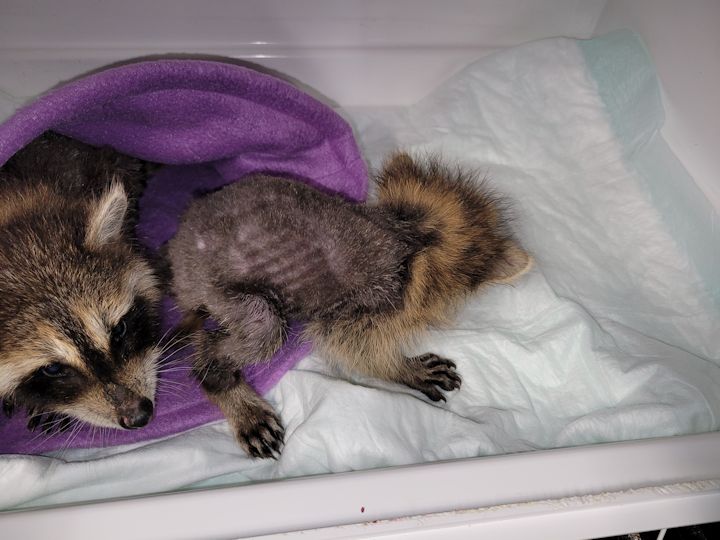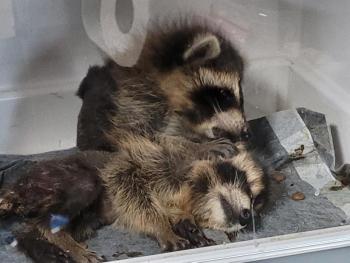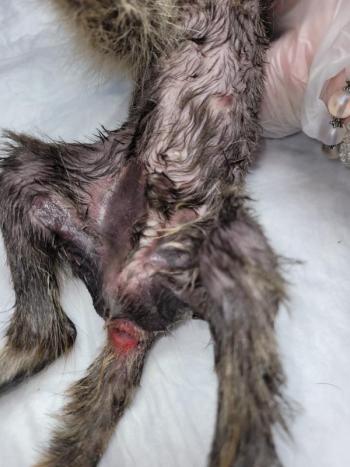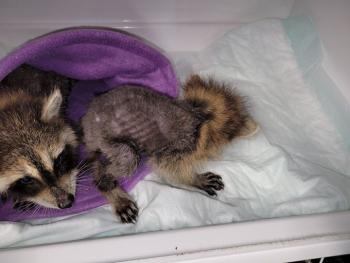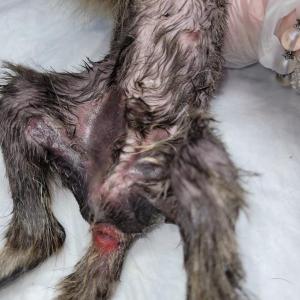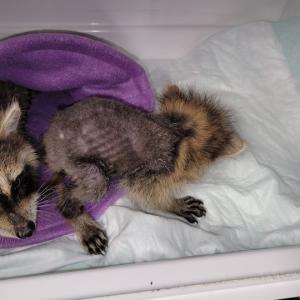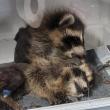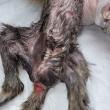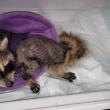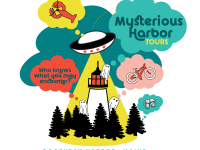Rescue of debilitated wild raccoon siblings captivates animal lovers everywhere
AUBURN—Summers are an exhausting time for licensed wildlife rehabilitators such as Jennifer Marchigiani, who has run Misfits Rehab since 2002. With so many babies born in the spring and summer months, in addition to the uptick in car-related and animal-related injuries, her basement is overrun with cages, incubators, and work tables piled with food and medicine. Already overwhelmed with intakes, Marchigiani got a call from a wildlife officer earlier this week, who had found two abandoned baby raccoons by a log pile, on the verge of death.
“We’ve been having so many issues with raccoons and disease this year; I was hesitant, but I thought, I’ll take them,” she said. “In a worst-case scenario, I could pass them to another rehabber.”
“When I first got a look at them, I was horrified,” she said. Beyond being emaciated and dehydrated, they were covered in fly eggs with newly hatched maggots invading every orifice. The male raccoon, whom Marchigiani dubbed “Little Brother” was in way worse shape than his sibling, “Big Sister.” It took the help of a groomer colleague, Kara Oster, to shave the raccoons down in order to combat the disgusting task of removing all of the maggots from their bodies.
Maggots release an enzyme in their saliva that starts digesting healthy skin, which was happening to Little Brother. “It looks like a severe burn all over his abdomen and legs,” said Marchigiani, who had to cover the lethargic raccoon in bandages. The other immediate problem with maggots infesting their orifices is that they were releasing toxins, leading to fever, lethargy, and shock.
This is exactly why, when untrained people find abandoned wildlife they should never try to treat the animal themselves.
“A lot of people who rescue a starving animal try to start shoving food in their face, but that's exactly what will kill them,” she explained. “The body is not functioning properly, because it doesn’t have all of the electrolytes to trigger all of the nerves in the body. The body temperature drops and the vital organs are taking up all of the body’s energy reserves. Once you put food in the body, it has to divert energy to the stomach to digest, which takes away the vital energy to keep the heart and lungs going.”
To revive the raccoons, Marchigiani had to slowly introduce a syringe of electrolytes, and after that, diluted formula.
It was touch and go for Little Brother. Big Sister was his only lifeline, which Misfits Rehab kept Facebook followers updated with daily videos of their progress,
In her Facebook update she wrote: The big sister would not leave her little brother alone. She was always at his side, laying on him, tugging lightly at his ear, keeping him stimulated in what seems like “moral support.” By day two, the female was stable well enough to be out of the incubator, but I am pretty positive that without his sister, the little boy would give up the fight.”
At the time of this story, the raccoons were on Day Five of being rehabilitated. At one point, Marchigiani wondered out loud on a Facebook post whether she was doing the right thing, trying to keep Little Brother alive or let him go.
The other issue behind the scenes, which most people don’t know, is that between the veterinary bills, medicines, formula, and the incubator, a rescue like this tends to hover around $5,000 out of pocket.
Misfits Rehab FB Update: July 6
Today we thought for sure we were going to lose Little Brother. When he was taken out first thing in the morning he was lethargic again and whining. I thought for sure "this is the end" and that yesterday's "progress" was the "calm before the storm". So many animals (including people) have a sudden burst of energy and appear to "get better" shortly before they pass. We were devastated but not ready to give up JUST YET.
Marchigiani typically takes on personal debt of upward to $10,000 each year rescuing animals, which is marginally offset by donations from the animal community and her Facebook page.
But, it was Big Sister, who was calling the shots.
“She’s definitely the fighter,” she said. “She’s doing great, already eating solid foods and digesting properly. She’s very protective of him. When I have to go in and handle him, sometimes she’ll growl and lunge at my hand, like ‘Don’t touch my brother.’ She’s showing all of the signs of being a Big Sister. In one of my first videos you could see how loving, worried and compassionate she was about him. She tried to massage him, revive him by tugging at him. As the days have gone on, she hasn’t left him alone. It’s like she’s saying, ‘No, you’re not going to just lay there and die.’”
Little Brother began improving even more on July 6.
“He’s beginning to get up on his own; he’s still staggering, but making progress,” she said. “He’s fighting taking nourishment by syringe, but that’s normal. It’s always a fight with raccoons in general. We don’t look like mom; we don’t smell like mom; we look like a predator to them.”
With recent articles in NPR like this one exposing TikTok stars who are glorifying keeping exotic and wildlife pets for clicks and clout, it’s important to impart to anyone who finds a wild animal never to keep it.
“People who think it’s so cute to have a baby raccoon until it grows up to be an adolescent and is unmanageable, pulling dishes out of your cupboard and breaking them, biting or scratching your pets and children, not to mention the diseases they can pass on to you,” she said. “Then, when it gets too big, people put the domesticated raccoon back in the wild where it will try to find another human to feed it. And of course, if if someone sees a raccoon running toward them they think it’s rabid and will likely kill it.”
Misfits Rehab is still taking donations for Big Sister and Little Brother through Facebook Pay via the posts on their page. For more information visit: Misfits Rehab
Kay Stephens can be reached at news@penbaypilot.com
Event Date
Address
United States

